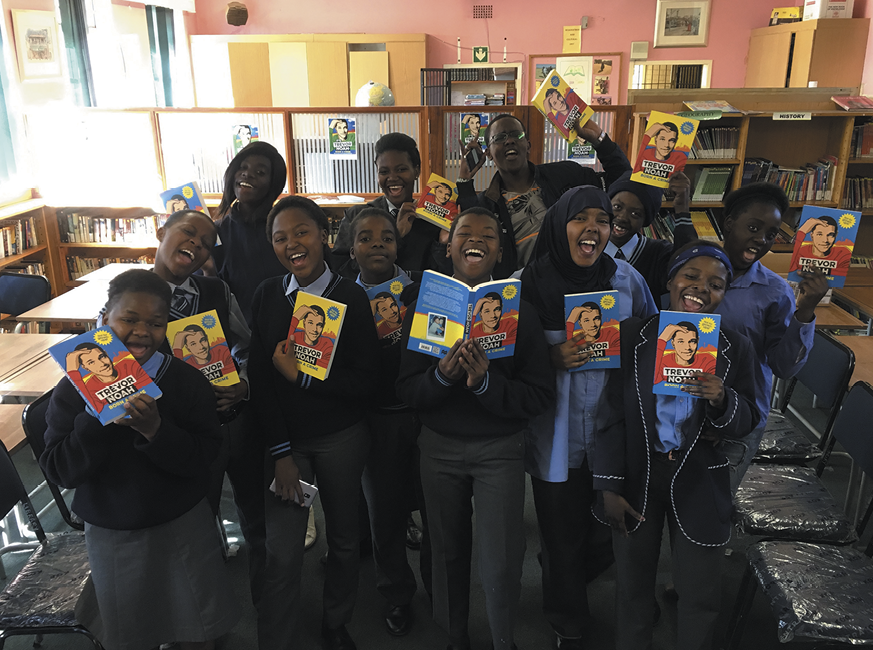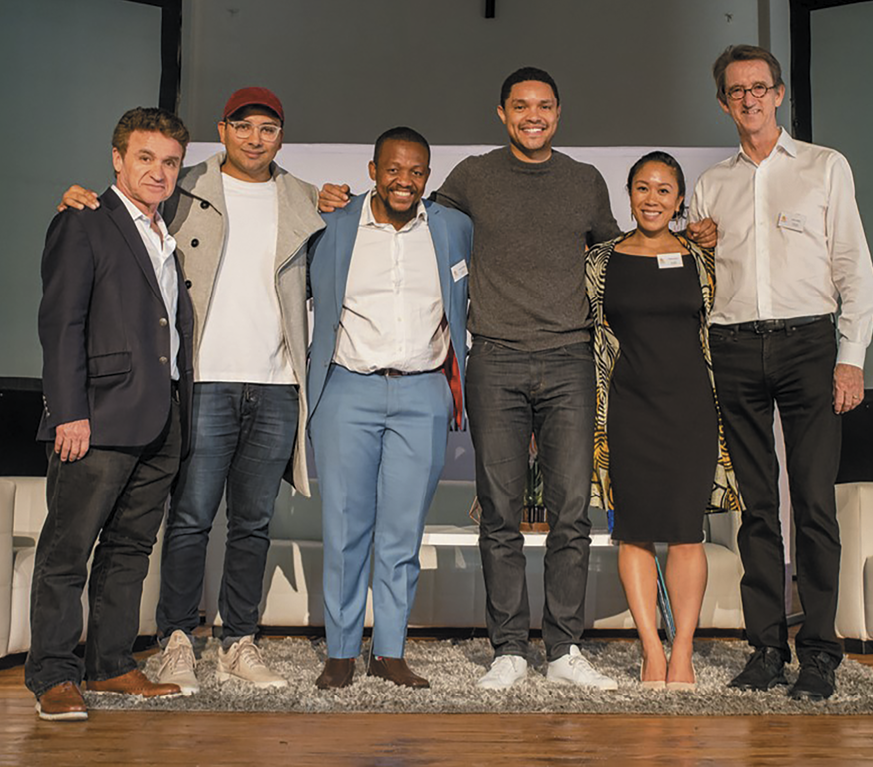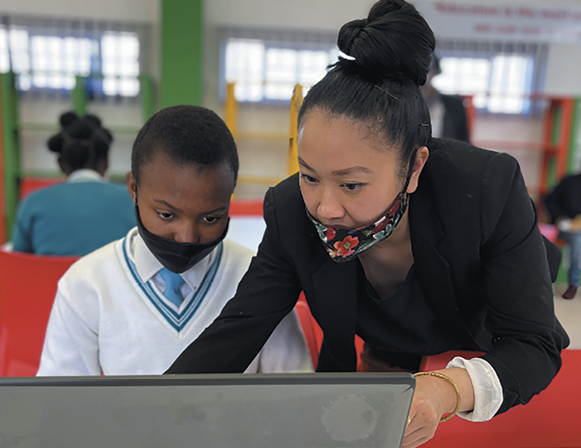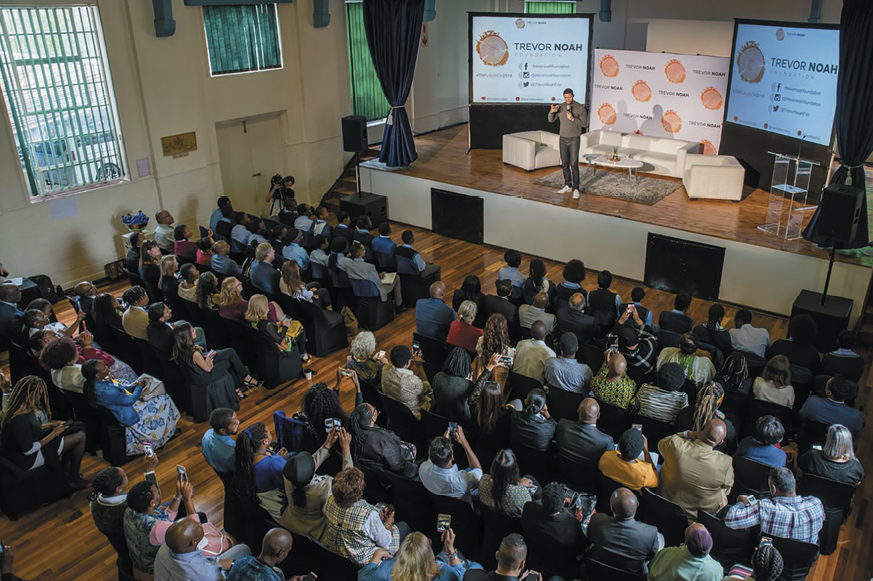- Home
- Media Kit
- MediaJet
- Current Issue
- Past Issues
- Ad Specs-Submission
- Reprints (PDF)
- Photo Specifications (PDF)
- Contact Us
- PRIVACY POLICY
- TERMS OF USE
![]()
ONLINE
![]()
ONLINE

Investing In
Africa’s Youth
Editors’ Note
Shalane Yuen is a mother, dynamic leader and the Founding Executive Director of the Trevor Noah Foundation (TNF), a South African-based nonprofit organization focused on enhancing equitable access to quality education. Since founding the organization in 2018, she has raised over $12 million in funding, expanded leadership training programs across Africa, and established partnerships with prestigious institutions like USAID, Oak Foundation, Young African Leaders Initiative (YALI) and Microsoft. With more than 13 years of experience in the social impact sector, Yuen has held various strategic advisory, research, and management roles. Originally from Hawaii, she consulted around the world before starting a family in South Africa, where she lived for ten years. Yuen’s academic credentials include an MPA degree in international nonprofit and public management and policy from New York University’s Robert F. Wagner School of Public Service and dual bachelor’s degrees in economics and sociology from the University of California, San Diego.
Foundation Brief
Trevor Noah Foundation (trevornoahfoundation.org) is an ode to the greatest gift Trevor Noah has ever received, learning. Fueled by Trevor’s love for education, for giving kids an opportunity, and for the teachers that got him to where he is today, the Foundation believes education is the seed from which everything grows. In 2018, the Foundation began supporting one school in Johannesburg that catered to orphaned youth. By 2025, the Foundation aims to have a direct and deep impact on 50,000 youth and an indirect impact on 500,000 youth by capacitating educators and building active communities. While the Foundation began its journey in South Africa, it aspires to extend its footprint across the African continent. Trevor Noah Foundation is a fund of the Entertainment Industry Foundation (EIF), a 501(c)(3) tax-exempt organization. EIF is a Charity Navigator Four-Star Charity that meets all 20 Better Business Bureau charity standards and carries the Candid Platinum Seal of Transparency.

New Nation School students read Born a Crime by Trevor Noah
Will you discuss your career journey?
My career journey is a tapestry of diverse experiences, each contributing to my growth. My path has been unconventional and enriching, from being an Impact Intern for Fair Trade USA in Oakland to a management consultant with FeverTree Consulting in Windhoek and a Business Advisor for the South African Supplier Diversity Council in Johannesburg. I’ve always been a practitioner at heart, learning by jumping into the deep end, unafraid to apply my knowledge and skills in new and challenging contexts.
I used to worry about being labeled a “jack of all trades,” but I’ve come to embrace my ability to see the big picture, collaborate creatively, and leverage a diverse skill set. This adaptability is my strength. My colleagues might say that foresight is my greatest asset, anticipating future needs and global trends to make informed decisions and remain ahead of the curve.
As I’ve grown in my career, I’ve come to understand the profound responsibility of leadership. I strive to bring others along with me and push them to the forefront. This commitment is best encapsulated by the inspiring Toni Morrison, “When you get these jobs that you have been so brilliantly trained for, just remember that your real job is that if you are free, you need to free somebody else. If you have some power, then your job is to empower somebody else.”
“Kids of today are being told to be the leaders of tomorrow, but they’re not given the tools. We tell people to follow their dreams, but you can only dream of what you can imagine, and, depending on where you come from, your imagination can be quite limited.”
Trevor Noah
What excited you about the opportunity to lead the Trevor Noah Foundation and made you feel it was the right fit?
They say success is where opportunity and preparedness meet. The Trevor Noah Foundation’s mission to improve equitable access to education captivated me immediately. Building something from the ground up, in collaboration with youth, teachers, and communities, aligns perfectly with my belief in the power of cross-sector partnerships to drive systemic change.
When I moved to Johannesburg in 2013, I used my strategic advisory and project implementation background to support Black-owned small businesses and entrepreneurs. Witnessing their challenges, I realized the critical role of education in economic success. This insight, combined with my academic background in economics and sociology, made the Trevor Noah Foundation’s mission a perfect fit for my skills and values.
Leading TNF is a journey – a blend of challenges and opportunities. It allows me to leverage my skills, build a movement, and work alongside Trevor’s infectious passion for a brighter future for South Africa’s youth. This alignment of mission, values, and professional challenges makes TNF not just a job, but an exciting and meaningful journey.

Trevor Noah Foundation Board of Directors
How do you define the Trevor Noah Foundation’s mission and purpose?
The Trevor Noah Foundation’s mission is to tackle the deep-rooted racial and economic inequalities in South Africa’s school system, which is one of the most unequal in the world. As Trevor says, “Kids of today are being told to be the leaders of tomorrow, but they’re not given the tools.” This mission resonates deeply with me. It aligns with my belief in the transformative power of education and my commitment to creating a more equitable society.
When we think about challenges in education, there are many interconnected. The gap in test scores between the top 20 percent and the rest is wider than in almost every other country. Some schools are functional and wealthy, while others are poorly funded. The reality is that in a 30-year-old democratic society, a South African child’s experience of education is still dependent on where they were born, their socioeconomic status, and the color of their skin.
We aim to level the playing field and ensure that all youth have access to high-quality education across Africa. When our youth thrive, we all thrive. We are committed to leaving no child behind, working tirelessly to create opportunities for every young person to unlock their potential and contribute meaningfully to their communities and beyond.
Will you discuss how the Trevor Noah Foundation approaches its work and provide an overview of its initiatives?
We work with a network of global and local partners to implement core initiatives across Africa. Our work empowers school leaders, co-creates solutions, and embeds long-term systems change in communities. Our initiatives impact youth (ages 3 to 35), educators, school communities, and township economies, focusing on three strategic areas: quality learning, skills, and pathways and thriving school communities.
Our flagship initiative, the Khulani Schools Program, started with one school partner in 2018 and now partners with nearly 20 public schools. We work alongside provincial governments to improve literacy, digital skills, psychosocial support, and infrastructure. By enhancing capacity and investing in school leaders, we impact over 10,000 youth and 600 educators annually in profound, meaningful ways rather than through one-off training.
In 2020, we launched Education Changemakers with the YALI Regional Centre for Leadership Southern Africa. This training for young educators involves four weeks of foundational leadership skills, interactive learning, and site visits. Leaders pitch their innovative ideas for improving outcomes, and we provide seed funding and post-training support to implement these ideas. Nearly 150 alumni have graduated since inception, of which 50 percent identify as living in a rural area. In June 2024, we launched our first cohort of 80 Education Changemakers with the YALI Regional Centre for Leadership East Africa in Nairobi.
I’ve had the privilege of working with great leaders, where even in the entry-level role of an intern, I was empowered with autonomy and respect. I learned the importance of a nurturing and supportive leadership. Conversely, my experience with not-so-great managers who lacked transparency or engaged in performative activism has taught me equally valuable lessons. They underscored the importance of genuine, inclusive, and collaborative leadership. These contrasting experiences have deeply influenced me and guided our approach at TNF. Through transparent data collection, collaborative partnerships, capacity building, and long-term community involvement, we ensure that our initiatives are effective and sustainable.

Supporting a learner in a coding workshop
How valuable is it in your role to have such deep engagement and commitment from Trevor for the work of the Foundation?
Trevor’s personal story of overcoming adversity through education is a powerful testament to our mission. Growing up in apartheid South Africa, his mother prioritized his education despite significant challenges. This personal connection inspires others and draws attention and resources to our mission, amplifying our impact.
As one of the most influential voices of this generation, Trevor commands attention when he speaks. He frequently advocates for Sustainable Development Goal 4, emphasizing the need for equitable and quality education, especially for African youth. Whether on stage with Melinda Gates or delivering a keynote at a Microsoft Summit for Global Nonprofits, Trevor passionately advocates for youth, education, and tech innovation. His genuine commitment and ability to drive action through his words are invaluable. I’ve witnessed firsthand how his advocacy can inspire and mobilize support. It’s magical.
How important are metrics to track and measure the impact of the Foundation’s efforts?
Metrics are vital for measuring our impact. Our monitoring, evaluation, research, and learning department prioritizes data-driven decision-making, continuously improving our processes. This ensures accountability to stakeholders, secures funding, and informs decisions for sustainable change in education. We set indicators with our partners, such as tertiary acceptance rates, teacher training outcomes, and improved literacy rates. These metrics enable us to track progress and ensure our initiatives effectively promote educational equity.
That said, it’s essential to recognize the nuance of human needs – impact measurement isn’t always conclusive, and the communities we serve are more than just numbers. Individual stories of change are compelling and often convey emotion in ways that metrics cannot. Remember that emotion drives action, not numbers. Sometimes, following your instincts and doing what feels right is equally vital.

The launch of the Trevor Noah Foundation in Johannesburg
Did you know at an early age that you had a passion for nonprofit work, and what has made the work so special for you?
I didn’t always know I had a passion for nonprofit work, but looking back, the signs were there. Growing up between Hawaii and San Francisco, I was influenced by a strong sense of community and the importance of helping others. In 2004, I watched the devastation of a tsunami in Thailand and felt a deep urge to help, even though I was too young to volunteer. This experience left a lasting impact on me.
Years later, I spent a semester studying economics in Thailand. The stark income inequality – how a bustling Bangkok city center and rural poverty could coexist – was eye-opening. This insight into global inequality shaped my commitment to addressing systemic issues.
Since becoming a mother, my work has gained a new purpose. It’s our responsibility to create a better world for our children and future generations. The Trevor Noah Foundation allows me to achieve this through collective effort and multiplied impact.
I still find profound fulfillment in witnessing those “aha” moments when young people or educators learn something new. These moments reveal vulnerability, hope, and the drive to push forward. It’s an honor to witness them.
One of my work’s most challenging yet rewarding aspects is shaping our organizational culture. Our staff is our greatest asset, and our work has significant emotional and mental demands. I focus on ensuring our team feels valued and supported because a happy, healthy team better serves our mission. We need to take care of ourselves to help others effectively. I feel a profound responsibility to build a company where I’d want to work – a responsibility I cherish.
What are your priorities for the Trevor Noah Foundation as you look to the future?
As I look to the future, my priorities for the Trevor Noah Foundation are to expand our impact and deepen our commitment to systemic educational equity. The International Monetary Fund (IMF) projects that by 2035, more young Africans will enter the workforce than the rest of the world combined. In South Africa, nearly half of the current teaching workforce will retire, severely affecting poorly funded schools and STEM subjects. This presents both a challenge and an opportunity to urgently invest in Africa’s youth.
I’m constantly considering how to scale our work in school leadership and digital skills to career pathways. This may involve funding innovative organizations already doing this work, implementing “train the trainer” programs based on our experiences, leveraging our network as an intermediary funder, or a combination of these strategies. These challenges and opportunities keep me up at night, but one thing is sure – the need is immense, it’s urgent, and we’re not stopping any time soon.![]()